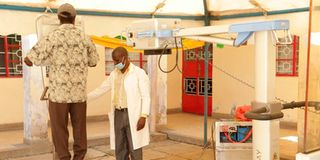Global impact of Covid-19 on TB is worse than expected, new study reveals

A medic helps a man climb a digital x-ray machine during a Tuberculosis (TB) screening drive at Magadi Catholic Church in Kisumu on March 17, 2021.
What you need to know:
- Drug-resistant TB costs have been on the rise with 688 such cases in the country as of 2019.
- Covid-19 pandemic has reversed the notification rate which was increasing by more than 10 percent since the first case was reported in Kenya in March last year.
Twelve months of Covid-19 pandemic has reversed the gains made over 12 years in the global fight against tuberculosis, a report has revealed. The Stop TB Partnership report was released on March 18.
According to the report, which is a unique United Nations hosted entity based in Geneva, Switzerland, the pandemic response has pushed aside tuberculosis outreach and services millions of people globally.
The World Health Organisation (WHO) ranks Kenya among the high burden tuberculosis countries in the world.
Globally, 104 million people are infected with TB of which nearly 1.5 million die each year. In Kenya, TB is the fifth leading cause of death.
According to statistics from the Ministry of Health, in 2019, 86,504 cases of TB were reported out of which approximately 10 percent were children.
Drug-resistant TB costs have been on the rise with 688 such cases in the country as of 2019.
Global TB burden
Covid-19 pandemic has reversed the notification rate which was increasing by more than 10 percent since the first case was reported in Kenya in March last year.
Data by the Stop TB Partnership shows that nine of the countries with the most tuberculosis (TB) cases —representing 60 percent of the global TB burden — saw a drastic decline in diagnosis and treatment of TB infections in 2020, ranging from 16 percent to 41 percent.
The findings were determined by looking at the diagnosis and treatment statistics for Bangladesh, India, Indonesia, Myanmar, Pakistan, Philippines, South Africa, Tajikistan, and Ukraine.
“Twelve years of impressive gains in the fight against TB, including in reducing the number of people who were missing from TB care, have been tragically reversed by another virulent respiratory infection," said Dr Lucica Ditiu, Executive Director of the Stop TB Partnership.
“In the process, we put the lives and livelihoods of millions of people in jeopardy. I hope that in 2021, we buckle up and we smartly address, at the same time, TB and Covid-19 as two airborne diseases with similar symptoms."
In addition to the worldwide drop in TB diagnosis and treatment, data emerging from India and South Africa shows that people infected with TB and Covid-19 have three times higher mortality than those infected with TB alone.
This makes contact tracing, case finding and bi-directional TB and Covid-19 testing essential.
“After less than a year, a vaccine was developed and is now being deployed to help contain, and hopefully end, the covid-19 pandemic," said Thokozile Phiri Nkhoma, Stop TB Partnership Board Member representing communities affected by TB.
“Although TB has been around since the time of the pharaohs, the only approved vaccine is 100 years old and doesn't fully work, especially in adults. First-line TB treatment for TB is several decades old, and drug resistance is on the rise, while the millions of people with TB who are not found and treated remain at risk of spreading the disease,” said Mr Nkhoma.
Lockdown
In May 2020, a study conducted by Stop TB Partnership in collaboration with Imperial College, Avenir Health, Johns Hopkins University and USAID predicted the impact of covid-19 related measures on TB.
Projections showed that at the global level, a three-month lockdown followed by a protracted 10-month restoration could lead to an additional 6.3 million cases of TB between 2020 and 2025 and an additional 1.4 million TB deaths during this time.
India was one of the first countries where the dramatic decline in TB notifications was seen — the national government's TB notification system, "Nikshay," reported a 70 percent drop.
Stop TB Partnership calls for global investment in TB outreach and treatment in response to the Covid-19 pandemic.
“The world needs to strategically prepare for future airborne pandemics building on the investments and strategies in TB response, including infection control; bi-directional testing and contact tracing; communities, civil society networks and primary health care as diagnosis entry points; and expanding the laboratory networks to support integrated approaches to tackling TB and covid-19," said the report.





